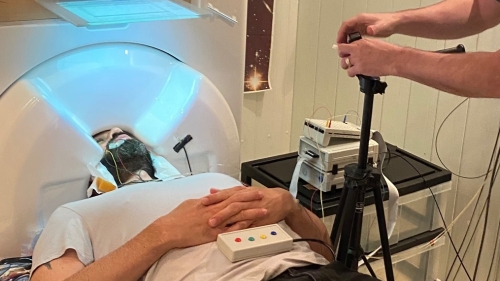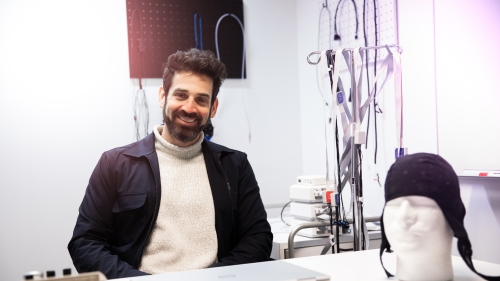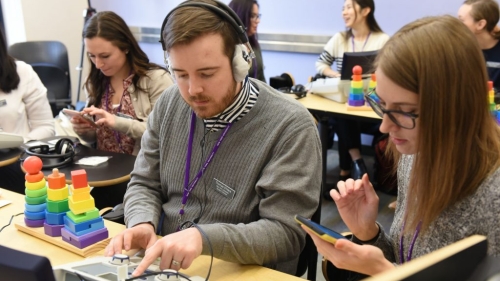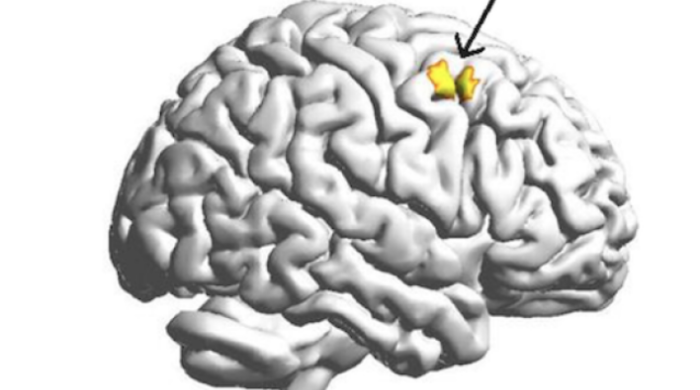Researchers found brain waves related to stopping body movements can predict stuttering.

Eric S. Jackson (left) during a magnetoencephalography scan conducted by Jeff Walker. Courtesy of Eric Jackson.
Beta waves are brainwaves associated with thought, actions, and reactions; for example, beta waves affect how you would react to a cyclist speeding toward you as you cross the street. New research finds that they can also predict when a person will stutter.
A team of speech and psychology researchers recruited 30 stutterers to identify 50 words that were likely to be stuttered. Participants were then shown a screen with visual cues prompting them to say each word. During this task, researchers monitored participants’ brain activity using magnetoencephalography (MEG)—a neuroimaging technique that maps the brain’s electrical currents. They found increased beta waves associated with the cues that preceded the words participants stuttered in comparison to the words participants spoke fluently.
Their findings are published in Neurobiology of Language.

Eric S. Jackson in the stuttering and vvariability (savvy) lab
“We know that in the context of this task, participants anticipate stuttering, meaning, they know when they are going to stutter,” says Eric S. Jackson, associate professor of communicative sciences and disorders at NYU Steinhardt. “Because stutterers are typically averse to stuttering due to a lifetime of negative reactions from listeners, their initial reaction involves inhibition or a ‘freezing-like’ response.”
The study says that the beta activity is likely occurring in the right pre-supplementary motor area, an area of the brain critical in pausing or stopping movements or actions. The authors note that MEG has limitations regarding spatial precision and therefore, while it’s not as likely, it’s possible that the beta activity could be occurring in a neighboring area of the brain such as the right dorsolateral prefrontal cortex which plays a key role in other forms of inhibitory control as well as memory and decision making.
Jackson says that previous research has focused on comparisons of fluent speech between stutterers and non-stutterers and that this experiment may encourage additional research focusing specifically on stutterers and their neural activity related to stuttered speech.
“This study is the largest and most balanced neurofunctional investigation of stuttered vs. fluent speech to date,” the authors write.
“We would like to further understand these responses in stutterers, especially whether or when they develop in children. We’re also interested in targeting these responses with neuromodulation to test whether altering activity in this area facilitates fluency for stutterers,” says Jackson.
This study was funded in part by National Institute on Deafness and Other Communication Disorders, (R21DC017821), as well as an internal University Research Challenge Fund grant, awarded to Jackson.
Press Contact
646-469-8496
Related Articles
Study Finds Stuttering Anticipation Prompts Unique Activity in the Brain
Researchers reveal elevated activity during stuttering anticipation in a part of the brain that plays key role in cognitive control.
McAllister Awarded Two NIH Grants Totalling $3.5M
Funding will support biofeedback technology research for different speech-language pathology applications.
Sonja Molfenter Awarded $3.77M for Proactive Pharyngeal Swallowing Exercises
Molfenter's study seeks to build muscular reserve in pre-frail older adults to improve health outcomes.
Related Department

Communicative Sciences and Disorders
665 Broadway, 9th floor
New York, NY 10012
Phone: 212-998-5230



